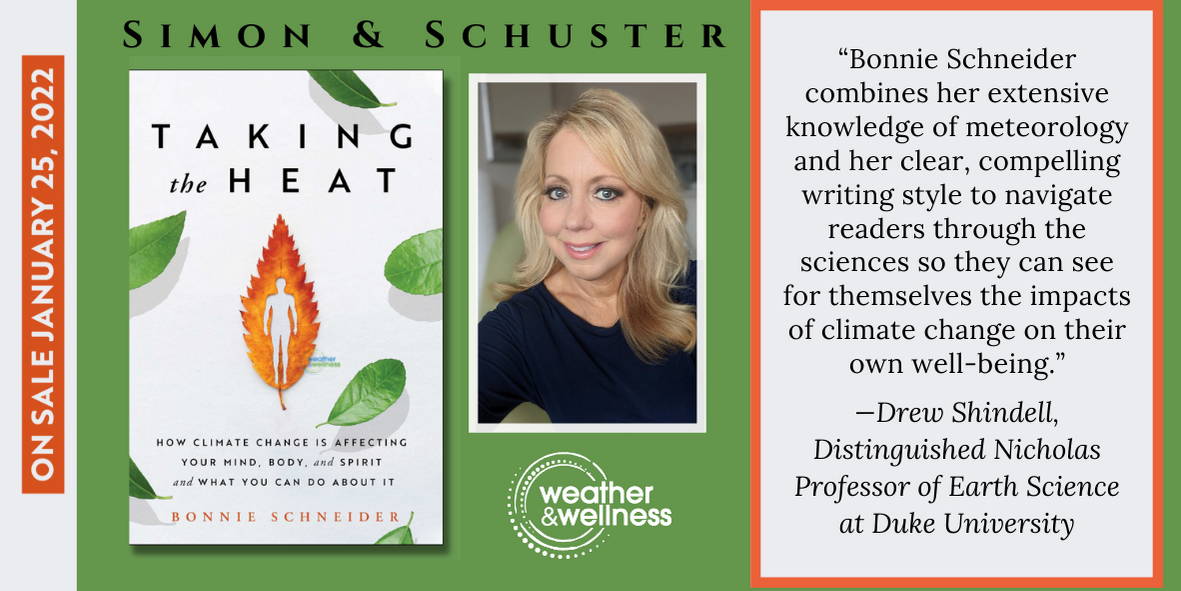Climate Health Analytics: Predictive Data to Improve Health Outcomes
Doctors say climate change is impacting their patients' health right now. Proprietary climate models can provide actionable insights customized for healthcare organizations
Boca Raton, FL United States Hospital Solutions Population HealthAbout our project

The problem we solve: Rising temperatures, volatile weather, and poor air quality are impacting our health in dangerous new ways. Allergy season has gotten longer and stronger. Wildfire smoke triggers asthma attacks, hospitalizations for strokes, and heart failure. The emotional anguish of increased extreme weather events can result in ongoing stress and anxiety, even long after the storm is over. Heat-related medical costs and deaths over the course of the next half-century are projected to reach at least $70 billion. These costs can be challenging to anticipate - from staffing to supplies.

About our solution: My research makes the data-driven connections between climate change and health care costs. I'm creating proprietary climate models for a customized predictive SaaS platform to assist healthcare organizations in better managing these added costs of climate change. This product can be folded into existing health tech infrastructure or developed as a separate software analytics product to license.

Progress to date:
Using preliminary hospital data of cases over two years matched only with temperature, there were spikes that correlated with extreme temperatures and psychotherapy visits. Since this test, I've now connected with MIT and other top climate data scientists to develop more sophisticated and detailed connections that will also include air quality and other environmental influences. I'm looking to acquire a substantial health claims data set to expand the project. The data scientists I'm working with can model climate risk in connection with various health datasets. Software and product design can implement these models on an interactive dashboard or as data to add value to existing health tech infrastructure.
About Our Team

Creator: Bonnie Schneider
Location: Florida
Education: Boston University
Bio: Bonnie Schneider is a national television meteorologist. She created the platform Weather & Wellness©, successfully launching its original video content focusing on climate change and health for New York-based Newsday’s digital site. Bonnie’s provided on-camera insight and expertise on everything from hurricanes to snowstorms for CNN, HLN, Bloomberg TV, and The Weather Channel. Her second book, Taking the Heat: How Climate Change is Affecting Your Mind, Body & Spirit, and What You Can Do About It, (Simon & Schuster) is available 1/25/22. Bonnie has over 260k followers on her social platforms.
Title: Founder
Advanced Degree(s): B.S.
About Our Company
Weather & Wellness, LLC
Location: 5030 Champion Blvd
G11-146
Boca Raton, FL 33496
US
Founded: 2019
Website: https://weatherandwellness.com
Blog: https://www.mindbodygreen.com/articles/how-climate-change-affects-health-from-meteorologist
Facebook: https://www.facebook.com/BonnieSchneiderWeather
Other link: https://vimeo.com/user10703050
Other link: https://www.weatherandwellness.com/articles-by-bonnie-gallery
Product Stage: Idea
Employees: 1-2
How We Help Patients
There are numerous benefits for patients for the product I am developing. Patients, for example, may have a general idea that their medications may be more or less effective, in some cases, on hot days. But are they aware of what the actual threshold is for that threat to occur? The technology I would like to develop would alert them in advance when temperatures and humidity levels (this is how the "heat index" is calculated- how the temperature "feels" to our bodies) are forecast to reach specific thresholds. This would potentially prevent additional hospital visits, reduce insurance claims, and provide a proactive tool that helps the patient. The same is true for other environmental factors like poor air quality due to pollution and wildfires. Wildfires, due to climate change, are becoming more frequent and widespread. Smoke from these fires can travel thousands of miles. Sometimes that smoke is visible - in terms of a "hazy" sky. But often this dangerous threat to breathing is not. Particulate matter is so tiny - less than a grain of sand it can go undetected. However, my product would provide more precise and easy-to-understand information on these threats to benefit both the patient and care providers.
Extreme weather events like hurricanes, floods, and snowstorms pose physical health threats, including injuries by flying debris, car accidents on flooded roads, and hypothermia. These natural disasters are also hazardous to emotional well-being. Certain patient populations - the elderly, children, and those with pre-existing mental health conditions, minorities, and low-income communities are more susceptible to being affected. My product would identify these environmental risks for the patients and their care providers. Did you know that minorities and low-income communities are more susceptible to extreme heat and poor air quality, particularly if they live in cities? Vector-borne diseases like the Zika Virus, which is transmitted by mosquitos, also pose a greater threat to these more vulnerable communities - as they may live near abandoned buildings and open garbage that attracts mosquitoes. The World Health Organization estimates that one-sixth of the illness and disability suffered worldwide is owing to vector-borne diseases, with more than half of the world's population currently at risk.
According to psychiatry.org: "Climate change and related disasters cause anxiety-related responses as well as chronic and severe mental health disorders. Flooding and prolonged droughts have been associated with elevated levels of anxiety, depression, and post-traumatic stress disorders. The trauma and losses from a disaster, such as losing a home or job and being disconnected from the neighborhood and community, can contribute to depression and anxiety."
Actionable insights, designed by medical professionals, would offer patients the potential for healthier outcomes.
Climate change is accelerating physical and mental health threats to patients. My research and platform put me in the ideal position to market and sell this product, once it's developed. My goal through this product is to help patients navigate these climate-induced weather events.
How We Help Physicians
I recently spoke at the annual meeting of The Medical Society Consortium on Climate & Health, which represents over 600,000 clinical practitioners. These medical professionals attest that climate change is harming Americans today. In their recent member survey, they found that "A majority of respondents report they are already seeing health harms from climate change among their own patients – most commonly in the form of increased cardiorespiratory disease (related to air quality and heat), more severe and longer-lasting allergy symptoms, and injuries attributed to extreme weather."
My product will be of great service to physicians and healthcare providers. Climate change threats can emerge in different ways depending on where you are located. My product, through my team's extensive knowledge of climate science and proprietary predictive models, will help physicians identify these hazards. This notice is crucial. Climate change has shown us that rising global temperatures mean that health threats can emerge in places where they were not previously expected. In my book, TAKING THE HEAT (Simon + Schuster) I interviewed a prominent Boston physician who was surprised to learn his patient was afflicted with West Nile encephalitis, which is not common in New England. Another ER physician in New York shared with me that there's been a rising number of dangerous Vibrio bacteria infections (a waterborne disease) in the Northeast. Nurses in Louisiana I interviewed have shared that depression, anxiety, and substance abuse can affect hurricane survivors even decades after the storm. These are just some samples of how climate change is affecting health practitioners' practices right now. Imagine if they had a tool to better anticipate these threats, based on where they are located, thanks to my proprietary technology and product in the future?
How We Help Hospitals
As Hurricane Harvey approached the Gulf Coast as a Category 4 storm on Aug. 25, 2017, "Texas hospitals braced for impact. Steadied by more than a decade of preparation taken from lessons learned in Tropical Storm Allison in 2002 and Hurricane Ike in 2008, hospitals leaders and frontline caregivers largely kept the hospital industry intact to care for thousands of patients in need.
Few expected that the storm would bring four more days of record rainfall across the Texas coast, causing extensive flooding. The ongoing demand for services from patients otherwise served by a community of clinics and specialty centers spiked for hospitals, and the window of time for preparation began to close as unexpected needs arose." - Texas Hospital Association in 2018, one year after Harvey.
James Mitchell of the Texas Children's Hospital provided this take-away from Harvey: “we think a hurricane is going to be done in two days, three days, maybe four at the most, and so one of the things that really struck us is that the reality of a five- to six-day event is something that we do have to plan for.”
As a TV meteorologist who's covered many hurricanes, I've seen how slight shifts in the storm's track can make a huge difference in where a hurricane makes landfall and which community is affected. According to researchers: "while hurricanes occur naturally, human-caused climate change is supercharging them and exacerbating the risk of major damage." Another study on Hurricane Harvey in 2020 focused specifically on hospital impacts reported: "For five days, flooding limited access to the hospital, with a consequent negative impact on provider staffing availability, disposition and transfer processes, and resource consumption. Interruption of patient transfer capabilities threatened patient safety..."
The Harvard Business Review reported that the "Santa Rosa Medical Center in California was impacted by catastrophic wildfires in 2017. Two hundred employees lost their homes, and the hospital had to close for weeks to clean and restock. During that time, people in the area found themselves struggling with smoke-related illness and trying to manage their medical needs without having their hospital to turn to..."
My own research evaluating data from a behavioral health hospital found that on days of temperatures below freezing, the percentage of visits that are for psychotherapy that are 53+ minutes long increases significantly compared to days with more normal temperatures.
How We Help Partners
A partnership with a health tech company that could incorporate my data and my platform would be mutually beneficial. For health tech companies with an existing infrastructure that connects data between providers and patients, calculates hospital expenditures, offers analytics and solutions through the evaluation of clinical, financial, and operational data, and/or delivers actionable insights to patients and providers, a partnership with me would be ideal. My proprietary climate modeling and professional platform would enhance and add revenue to their companies and offer a new area to profit from through future product development.
Innovation Details
Intellectual Property Summary
I have the rights to my research and concept.
Clinical Information
https://www.thelancet.com/journals/lanplh/article/PIIS2542-5196(21)00053-X/fulltext
https://globalhealth.harvard.edu/domains/cc-health/
Regulatory Status
n/a
How we will use the funds raised
The money will be spent on research and acquisition of health data, climate modeling, and software development. Plus, product design, and testing.
Thank You
I'm grateful for this opportunity to share my endeavor on Medstartr. My research is timely, my professional platform through years of working as a national TV meteorologist places me in the perfect position to promote and market this future product. I'm connected professionally to numerous decision-makers in the healthcare industry.
I believe that while most of us are aware that climate change is affecting us, it's not as clear how and in what way. I've detailed these connections effectively in my recent book, TAKING THE HEAT (Simon + Schuster), and through numerous media appearances. Now, my innovative predictive analytic concept can serve as a profitable investment and an important tool to serve the healthcare industry and patients.
Thank you for your review and consideration. Please let me know if you would like more information or have questions.
Best,
Bonnie Schneider
Updates
No updates found .
Supporters
-

09/14/2022 - Liked the project.
07/11/2022 - Liked the project. , MS
, MS
05/06/2022 - for the Get a Hard Copy
Comments
-
We360.ai kumar posted on 9th May, 2022
Its really helpful. Nowa days it is important to that the workplace should take care of the employee wellbeing. We360.ai's health360 feature helps to keep the check on the same.
Click here to LoginInstant Feedback
Help us find best new ideas to fund by telling us what you think. Your feedback goes straight to the team behind this project in private, so tell them what you really think.
3Medstartr
Index Score3
Interest
Score0
Adoption
Score3
Likes0
Partners0
Pilots0
Follows-
This campaign has ended but you can still get involved.See options below.
$20 pledged of $500,000 goal
Instant Feedback
Help us find best new ideas to fund by telling us what you think. Your feedback goes straight to the team behind this project in private, so tell them what you really think.




